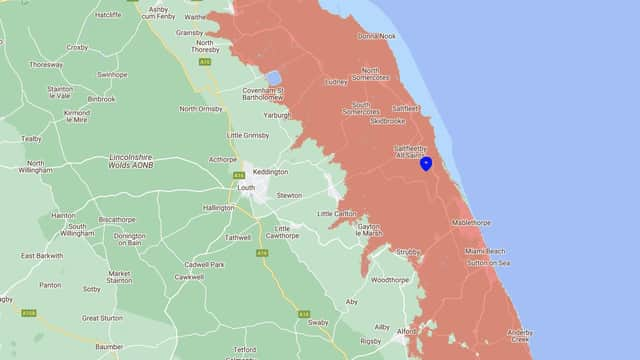More concerns for Theddlethorpe as professor highlights climate-induced flooding concerns


Dr Paul Dorfman, chairman of the Nuclear Consulting Group and a Visiting Fellow at the University of Sussex, noted that rapid climate changes, which are surpassing predictions from just a few years ago, are a major challenge for the potential site for the Theddlethorpe Geological Disposal Facility, proposed by Nuclear Waste Services.
The Climate Central website indicates vast areas of Lincolnshire at risk of flooding within the next decade and for the subsequent 150 years, meaning large chunks up to Alford, Little Carlton, and North Cockerington will be under water by 2050.
Advertisement
Hide AdAdvertisement
Hide Ad“Events in the poles, oceans heating, and other key indicators mean that what we thought we knew, we probably didn’t,” said Professor Dorfman.
The primary threat to the Theddlethorpe site, according to Dorfman, is the ‘storm surge’ resulting from climate-induced sea-level rise.
This event transpires when specific atmospheric conditions align with high tides, causing the sea to advance inland.
Though Professor Dorfman lacks personal connections to Theddlethorpe, ensuring an unbiased view, he has extensively studied the climate’s effect on nuclear infrastructure.
Advertisement
Hide AdAdvertisement
Hide AdReferring to his report on Britain’s nuclear submarine base endangered by climate change, he stressed the immediate need for action.
“Given the current and ongoing climate evidence-base, and the fact that climate impact risk, especially storm surge flooding risk, is ramping – it probably makes good sense to put to one side any thought of a new high-level nuclear waste disposal facility at Theddlethorpe,” Dorfman advised.
Addressing these issues, a representative for Nuclear Waste Services, the firm proposing the Theddlethorpe Geological Disposal Facility (GDF), stated: “A GDF will only be constructed where a suitable site and a receptive community coexist.
“Comprehensive studies, spanning several years, will be conducted to pinpoint an appropriate GDF site, encompassing flood risk and climate change assessments.”
Advertisement
Hide AdAdvertisement
Hide AdThe representative further noted, “As well as protecting people and the environment, the GDF initiative offers a chance to positively reshape the host community for future generations.”
Yet, with mounting evidence of the tangible threats posed by climate change, the debate surrounding Theddlethorpe’s nuclear storage proposals intensifies.
The community’s need for a thorough and enlightened discussion is paramount.
Lincolnshire County Council leaders recently set a 2027 deadline for a public referendum on Theddlethorpe’s nuclear storage proposals, eliciting demands for a swifter decision.
Advertisement
Hide AdAdvertisement
Hide AdWhile Councillors Martin Hill and Craig Leyland, central figures in the community partnership established by Nuclear Waste Services (NWS), champion a ‘test of public support’ by 2027, opposing factions such as the Guardians Of The East Coast contest the extended timeline and potential misallocation of public resources.
Coun Hill said: “We have been talking about this idea for a number of years already. What we are suggesting will give ample time for people to have formed an opinion and for the community to take a vote.”
However, campaigners from the Guardians of the East Coast said: “This process has been underway for two years now and recent election results gave both LCC and ELDC an emphatic NO to the nuclear waste dump.”